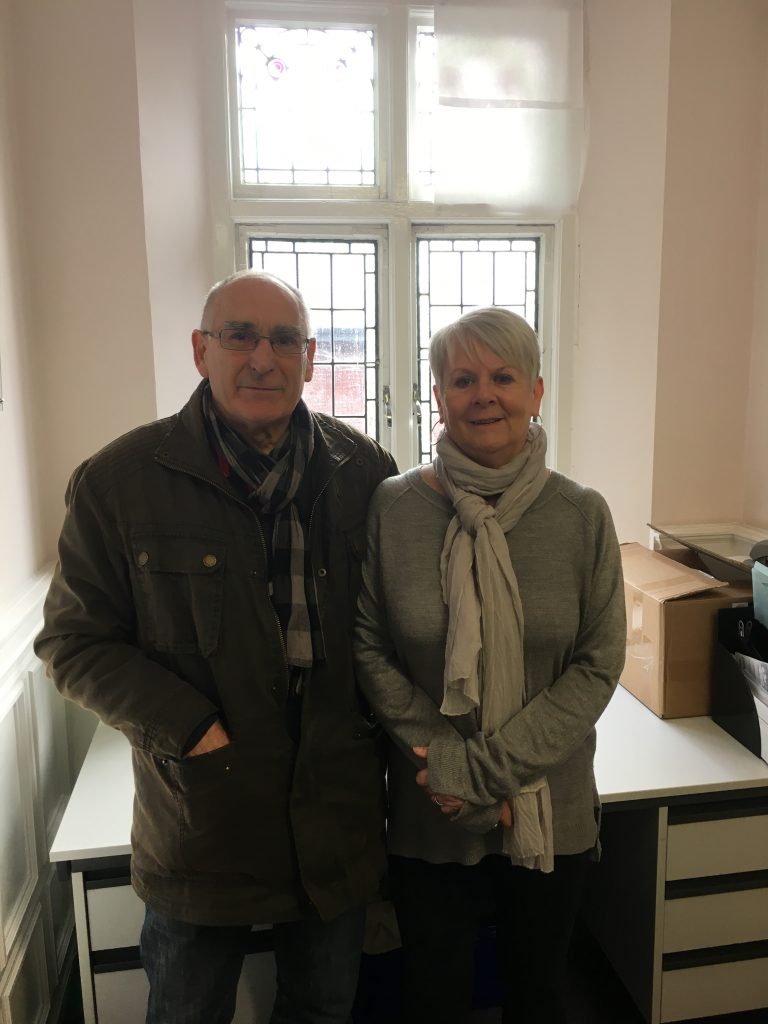
2018 marks exactly 10 years since Pauline and Bernie’s son, Gary, suffered a traumatic brain injury. The exact date and time, 3 November 2008 9.45pm, will be etched on their minds forever. Gary was loving life and working at a tattoo studio at the time. After work, he left with a colleague to go and see a band play, but the music wasn’t quite to his liking, and so he left early. He was hurrying through the Tottenham Court Road Underground Station when he lost his footing on the stairs and hit his head so hard he was knocked unconscious. A passer-by called for an ambulance.
Emergency Surgery Following Traumatic Brain Injury
Gary was taken directly to The Royal London Hospital where he had to undergo emergency brain surgery to save his life having sustained three blood-clots in his brain. After spending two weeks in a coma, he was gradually woken up. Pauline and Bernie had been told to expect that Gary would have a long road to recovery, but nothing could prepare them for his reaction. “It was terrifying” recalls Pauline. “He was confused, angry, and pulling all his wires out at every opportunity”. In the end, nurses had to restrain Gary to keep him safe. “What I didn’t expect was the regression” adds Pauline. “Gary would plead with me to take him home and would say ‘I’ll be a good boy, mum’, when he was 40 year-old man living independently”.
Getting Back to Independent Living
As part of his recovery and to prepare him for independent living, Gary was transferred to the Blackheath Brain Injury Rehabilitation Centre. It was a long road to recovery and took 10 months to return home. In the last month at BlackHeath, Gary lived in an independent flat. Here he had an almost deadly accident. He put a microwave meal on the length of time required for oven cooking and set fire to his flat. “Even to this day, he doesn’t remember the incident” says Pauline.
Perception of Danger
“He also doesn’t see danger” adds Pauline. He once turned up his local Headway meeting with a Viking sword to show fellow clients and he simply didn’t see the risk. “Once, we went up town and I noticed he was bleeding”, adds Pauline. Gary had accidentally cut the top of his finger off, but didn’t think to say anything to her even though it was a very deep cut. People also do not ‘see’ his brain injury. “Gary has some tattoos. People automatically make a judgment. They might think he is drunk or on drugs or that he has mental health issues. Nobody thinks ‘acquired brain injury’. It’s a hidden disability” adds Pauline.
Loneliness
It’s also very lonely. Gary is not the same person he was before his acquiring a brain injury. “Understandably, his friends found it difficult to relate to him and they gradually stopped seeing him. But when a person changes in such a big way, you can’t blame people for not being able to connect anymore”, says Bernie. “He also struggles to make new friends. His brother takes him shopping every Saturday and two Headway volunteers visit him each week, but other than that he doesn’t socialise”, says Pauline. Now, Pauline and Bernie take it in turns once a week to make the 120 mile round-trip by public transport to visit Gary and make sure he is ok.
Carer Support At Headway Essex
Life’s still very much a roller-coaster for Pauline and Bernie as well as Gary. But, as carers, they have found a great deal of support through Headway Essex. They were already familiar with Headway, as Gary has received support from Headway East London, so they reached out to Headway Essex. They’ve been accessing Headway Essex’s community support for several years now and find attending a Carers Support Group immensely beneficial. “Having other people to talk to who are caring for a loved one with a brain injury means you feel much less alone. They understand and you can speak freely about your challenges and frustrations as a carer”, says Pauline. “I would give Headway Essex 10 out of 10; it’s superb. If we hadn’t have got in contact we would have been very stuck. Not just with the emotional weight of things, but with all the complex paperwork that comes with caring” adds Bernie.
Volunteering
Being a carer and friend of Headway Essex for many years, Pauline now volunteers her time and helps at Support Groups where both clients and carers are in attendance. “I love volunteering at the groups. I feel part of something really important. Not only am I helping Headway Essex, I have a much clearer understanding on what it is like to be the person living with acquired brain injury. I know first-hand what it means to be a carer, but it’s really useful to learn more about the struggles clients have to contend with and the coping strategies they have in place to help them.”
Thank you Pauline and Bernie for taking the time to talk to us and sharing your moving story.
If you would like to share your story or contribute to a blog, please contact Molly Harmon on 01206 845945 or email molly.harmon@headwayessex.org.uk.
